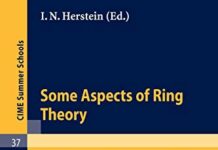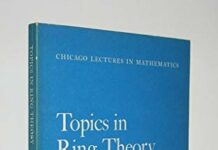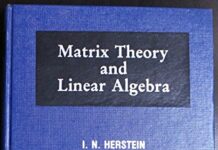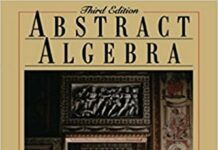
Ebook Info
- Published: 1991
- Number of pages: 388 pages
- Format: PDF
- File Size: 6.47 MB
- Authors: I. N. Herstein
Description
New edition includes extensive revisions of the material on finite groups and Galois Theory. New problems added throughout.
User’s Reviews
Editorial Reviews: About the Author Israel Nathan Herstein was a mathematician, appointed as professor at the University of Chicago in 1951. He worked on a variety of areas of algebra, including ring theory, with over 100 research papers and over a dozen books.
Reviews from Amazon users which were colected at the time this book was published on the website:
⭐Ok, as of now, I’m not a huge fan of algebra. I feel that this is a result of using Artin’s algebra text (which has a very strong flavor that you may or may not like) and the fact that algebra feels like a collection of topics as opposed to a coherent theory. However, this book makes me tolerate algebra, and I must certainly applaud it for doing so.Herstein is one of the best mathematical writers I have read. I feel that he tops Spivak, Stillwell, and possibly even Rudin. I’d probably rank him with Axler. He writes with clarity and enthusiasm, and his obvious love for the subject is dripping off every page. Hertein is somehow able to take a very typical algebra book, and make it into something enjoyable. One important thing to note is that this book is not quite as flavored as Artin’s is, and this is the result of Herstein treating conventional topics in a rather conventional way. People tend to either love or absolutely hate Artin, but no one could truly hate this book’s presentation.As commented on by many reviewers, this book is especially strong in group theory. This book takes time to build up more theory than most other books, and it does so in an exciting way. However, after Herstein’s discussion of groups, this book becomes quite shallow in many areas. He dedicates only one subsection to modules, and many reviewers have commented on the skimpiness of his field and Galois theory sections. This is a book that will be easily outgrown by anyone who uses it, and this is the reason I have given it four stars. I cannot really comment on what good references for undergrads would be on modules, but Stillwell’s
⭐is a good introduction to field and Galois thorey. The sheer fact that a student would need to supplement an already expensive book with others is quite annoying. Artin, on the other hand, spends a chapter on rings, and chapter on modules, a chapter of fields, and then finally a chapter on Galois thoery. The fact that Artin gives decent discussions of each of these topics has caused me to begrudgingly return to his book and start looking for buyers of this one. I feel that this is the reason that so many more classes will opt to use Artin as opposed to this book.However, I don’t think that this book is useless or will become obsolete. I feel that anyone who works through this book will easily be able to begin using a book like Lang’s Algebra. So I guess the choice of whether to use this book or Artin’s will come down to the professor’s (or buyer’s) preferences in what should be covered and where to put the emphasis.Like I said before, I’m not a huge fan of algebra, but I did enjoy this book. So I’m guessing that if anyone who actually likes algebra picks this book up, then they would probably view this book as the greatest thing ever. One word of caution, this is a more beefed up version of his
⭐, and so only stronger undergraduates should consider using this. This book is, after all, conventionally used in honors sequences.
⭐Apparently one of the wellsprings to the previous generation of algebraists, this remains the ultimate introduction to modern abstract algebra and key topics like group theory, rings etc. While it doesn’t focus upon category theory and such modern topics it gives a really thorough and discursive introduction to the core topics and constantly gives direction and motivation – and excellent well integrated examples that the vast majority of modern algebra books totally lack. The discussion is conversational and gives a real sense of why methods are developed and used. And while few diagrams are used the commentary is so clear and helpful that it nonetheless brings the whole subject to life.But sad to see that scarcity value is clearly limiting access by the outlandish prices for available copies.
⭐Herstein’s Topics is the clearest, most naturally motivated exposition of abstract algebra. At any point in the text, the reader can sense the careful development of the whole. The exercises aren’t a grad student’s hodgepodge or filter that satisfies the publisher’s urging to justify the latest edition. Dummit and Foote come across as confused and rushed in comparison. If you’re absolutely new you abstract algebra, perhaps you’ll feel better starting with Hungerford, then moving on to Herstein, or maybe working with them in tandem. Then cap off your journey with Van den Waerden.
⭐Large selection of topics. Assumes that nebulous quality called mathematical maturity, but the math is manageable for readers committed to learning this beautiful branch of mathematics.
⭐I wonder if all the reviews I see are of “Topics in Algebra”, 2nd ed. or “Abstract Algebra”, 3rd ed. The second book is a good undergraduate introduction. However, Topics could be use at the graduate level. I. N. Herstein was a great authority and his writing has unusual clarity. Topics is not only more advanced than the other but I think it is simply the better book. The first edition helped me in graduate school some thirty years ago. The treatment of group theory is particularly rich, with a thorough explication of the Sylow theorems.
⭐Required Textbook, but at Amazon you get new condition at half the bookstore price, arrives on time (fast) and in great condition. Easy and quick transaction with a source you can trust. I never worry about being ready the first day of class.
⭐Wonderful Topics in Algebra, 2nd Edition. My husband was jubilant to have this book again!
⭐good
⭐I’ve used this book mainly for group theory. The material is presented well and the proofs are elegant. The exercises are very fun to do and the problems range in difficulty.I’ve used Artin before this and I love that book too (you should grab that book if you’d rather have a more matrix oriented approach).Overall, this is my favourite book for group theory at an undergrad level. Pick this book up if your proof ability is above average. Couldn’t recommend this book strongly enough!
⭐A Classic book having strong mathematical rigor. Not an easy read. Excercises are coceptual. Historical background of each topic adds beauty. Background in Calculus, analysis, proof writing,algebra needed to study the book in detail. Takes time to complete each chapter but is enjoyable. Author presents some challenging problems in the excercises.
⭐amazing price with amazon!concepts are same as older version of this book!,now the book is published with new front cover!,something feeling different with this book!,Anyhow very nice book for pg level students!.
⭐This is very useful book.
⭐Nice for educational purposes
Keywords
Free Download Topics in Algebra, 2nd Edition 2nd Edition in PDF format
Topics in Algebra, 2nd Edition 2nd Edition PDF Free Download
Download Topics in Algebra, 2nd Edition 2nd Edition 1991 PDF Free
Topics in Algebra, 2nd Edition 2nd Edition 1991 PDF Free Download
Download Topics in Algebra, 2nd Edition 2nd Edition PDF
Free Download Ebook Topics in Algebra, 2nd Edition 2nd Edition



